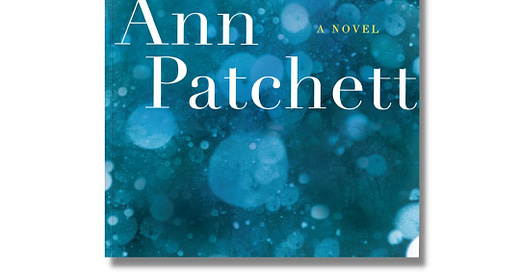'Run': Family drama
Ann Patchett examines the ties that bind, whether we know about them or not.
This post contains an affiliate link or links. If you use a link to buy a book, I may earn a small commission. You can find all the books that have been featured in this newsletter in my Bookshop store.
Last month I spent a week in New England, which meant treating myself to several books set there for vacation reading. My favorite was “Run,” Ann Patchett’s novel about one 24-hour period in Boston that tests the ties binding one family.
It’s winter, and a snowstorm is about to dump itself over the metro area. Bernard Doyle, former mayor of Boston, is in Cambridge, where he’s saved seats for his sons — Tip and Teddy, both in their early 20s — at a Jesse Jackson speech. His sons arrive reluctantly. Their Da has carted them to political events their entire lives; they can both quote Jackson, and numerous other politicians, by heart. And they have other interests now: fish and medicine. They show up out of habit and filial duty.
After the speech, they emerge into the promised snowstorm. Tip tells their father he’s not going to attend these events anymore, which doesn’t please Bernard. As they argue, Tip steps backward into the street, into the path of an oncoming SUV. Someone rushes at him, shoves him out of the way, takes the hit for him. As she lies bleeding in the snow, the Doyles see only a stranger. But her middle-school-aged daughter seems to know exactly who they are.
I should mention here that the brothers are adopted. Doyle is white. His wife was white. The brothers, adopted at 14 months and birth, are Black. The woman, Tennessee, and her daughter, Kenya, are Black. As they all regroup at the hospital — Tennessee is badly hurt, and Tip had his foot run over — Kenya asks the two young men, “Don’t you ever wonder about your mother?” And she doesn’t mean the late Bernadette Doyle.
It’s not hard to see where this is going. We’ve already made Kenya’s acquaintance, and so we know a few things Tip and Teddy don’t. But Patchett, ever the skillful storyteller, lulls us — well, me, at least — into complacency before springing another plot twist upon us. Family drama, indeed.
Patchett’s great accomplishment in “Run” is to flesh out each of her characters so fully that we recognize bits of ourselves in each of them and their relationships. Take Sullivan, older brother of Tip and Teddy, biological son of Bernard and Bernadette. We all run from family at various times and to various degrees; Sullivan personifies that running, having lived overseas for years. When Tip is discharged from the hospital, the Doyles take him and Kenya home to find Sullivan unexpectedly there. He jokingly complains that none of them thought to leave him a note. Bernard is not amused, not least because Sullivan missed Christmas three weeks earlier without a word.
Sullivan tonight? Think of all the nights they waited up, waiting and wanting Sullivan to come and then tonight there he was. They should have slept at the hospital.
Sullivan, for his part, begins to regret coming home, even though he is in need of refuge just then.
From now on he swore his visits home would be divided by decades and spent in hotels. This business of coming back to take your little part in the play you would never again be the star of was simply more than anyone should have to bear.
I read those lines on a plane heading west, carrying my husband and me 3,000 miles from where we grew up. It could be said that we, too, ran away from our families, and will never again be the stars of the play.
Unless you consider the family we created, the next generation. The next generation in “Run” is made up of runners — Sullivan figuratively, the rest literally. And Kenya, the youngest, is the fastest of them all, the one destined to be a star. She’s been running toward the Doyles her whole life.




This is a lovely informative review of a book I am planning to read. I'm an admirer of Ann Patchett's fiction, very much enjoyed The Dutch House, also a family saga.